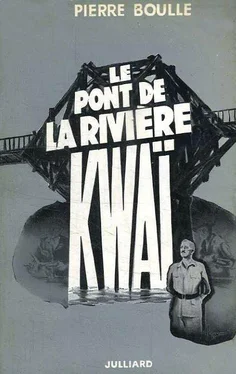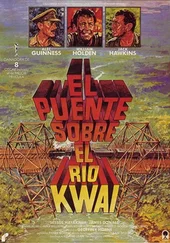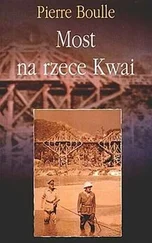These various quantities had not been chosen at random. They had been determined after much calculation and long discussion, and were based on the measurements that Joyce had taken during his reconnaissance. A formula, which all three knew by heart, gave the weight of charge required for shattering a beam of any given material, according to its shape and size. In this case six pounds of plastic would have been enough, in theory. With eight, the margin of security would have been ample for any ordinary operation. Number One eventually decided to increase die amount still further.
He had good reasons for adopting such measures.
Another of the Plastic and Destructions Company’s principles was to add a little on to every figure provided by the technicians. At the end of the theoretical training, Colonel Green, who ran the Calcutta school at a very high level, used to deliver a short address on this subject, based on common sense and his own personal experience of engineering.
“When you work out the weight needed by means of the formula,” he would say, “make a generous allowance —then add even a little more on. On a tricky operation you must make absolutely certain. If you’re in the least doubtful, it’s better to use a hundred pounds too much than a pound too little. You’d look pretty silly if, after slaving away, for several nights perhaps, in order to prepare the target, after risking your life and your men’s fives, after getting so far after God knows how many difficulties—you’d look pretty silly if, for the sake of saving a few pounds of explosive, the destruction was only a partial success—beams knocked about a bit but still in position, and so quite easy to repair. I’m speaking from personal experience. That’s what happened to me once, and I can’t think of anything in the world that’s more demoralizing.”
Shears had sworn he would never allow such a disaster to happen to him, and he generously applied the principle. On the other hand, one had to guard against going to the opposite extreme and cluttering oneself up with a lot of useless material when there was only a small team available.
In theory, the launching of the material presented no difficulty. One of the many qualities of plastic is that it has about the same density as water. A swimmer can easily tow quite a large amount of it behind him.
They had reached the River Kwai at dawn. The porters had been sent back. The four men had waited till nightfall, hidden in the undergrowth.
“The hours must have dragged by,” said Warden. “Did you manage to get to sleep?”
“Hardly at all. We tried to, but you know what it’s like just before zero hour. Joyce and I spent the whole afternoon chatting. I wanted to keep his mind off the bridge. We had the whole night to think about that.”
“What did you talk about?” said Warden, who wanted to know every detail.
“He told me a little about his civilian life. A rather sad type at heart, that lad. A pretty dull career on the whole—draftsman in a big engineering firm; nothing brilliant about it, and he doesn’t pretend there was. A sort of glorified office boy. I’d always imagined it was something like that. Two dozen chaps of the same age sitting all day long over their drawing boards in a communal workroom—can’t you see what it was like? When he wasn’t drawing, he was working out sums—with formulae and a slide rule. Nothing particularly exciting. I don’t think he was too keen on the job—he seems to have welcomed the war as the chance of his lifetime. Strange that a chap chained to a desk should have landed up in Force 316.”
“Well, after all, there are professors in it as well,” said Warden. “I’ve known quite a few like him. They’re not necessarily the worst of the bunch.”
“And not necessarily the best, either. You can’t make a general rule about it. But he’s not at all bitter when he talks about his past. Just rather sad, that’s all.”
“He’s all right, I’m sure. What sort of drawing did he have to do?”
“By a strange coincidence, the firm had something to do with bridges. Not wooden bridges, of course. And they didn’t handle construction work, either. Articulated bridges in metal—a standard model. They used to make them in separate pieces and deliver them all together to the contractors—just like a Meccano set! He was never out of the office. For two years before the war he drew the same piece over and over again. Specialization and all the rest of it—you can imagine what it was like. He didn’t find it terribly exciting. It wasn’t even a very big piece—a girder, that’s what he said. His job was to work out the shape that would give the greatest resistance for the smallest weight of metal, at least that’s what I understood him to say. I don’t know anything about the subject. It was a question of economy—the firm didn’t like wasting material. He spent two years doing that—a boy of his age! You should have heard him talk about that girder! His voice was trembling. You know, Warden, I think the girder was partly responsible for his enthusiasm for the present job.”
“I must admit,” said Warden, “I’ve never seen anyone quite so keen on the idea of destroying a bridge. I’m beginning to think, Shears, that Force 316 is a heaven-sent opportunity for men like that. If it didn’t exist, we’d have had to invent it. Take yourself, now; if you hadn’t been fed up with regimental soldiering…”
“And if you, for instance, had been completely satisfied with lecturing at a university… Well, whatever the reason, at the outbreak of the war he was still completely absorbed in that girder. He told me quite seriously that in two years he had succeeded in saving a pound and a half of metal, on paper. That wasn’t too b#d, it seems, but the firm thought he could do still better. He would have had to go on like that for months on end. He joined up during the first few days. When he heard about Force 316, he could hardly wait. And people still say there’s nothing to predestination. It’s a funny thing, though. If it hadn’t been for that girder, he probably wouldn’t at this very moment be lying flat on his face in the undergrowth a hundred yards from the enemy, with a knife in his belt and an instrument of wholesale destruction by his side.”
Shears and Joyce had chatted like this all day, while the two Siamese conversed in an undertone about the expedition. Shears had an occasional twinge of conscience, wondering whether he had chosen the right man for the most important role, the one who, of the three of them, had the best chance of succeeding; or whether he had simply succumbed to the earnestness of Joyce’s entreaties.
“Are you quite sure you’ll be able to act as decisively ill as Warden or myself no matter what the circumstance?” he had solemnly asked for the last time.
“I’m absolutely certain now, sir. You must give me this chance.”
Shears had not pressed the point and had not reconsidered his decision.
They had started the launching just before dusk. The bank was deserted. The bamboo raft—which they had themselves built, since they trusted no one else to do the job properly—consisted of two separate, parallel sections, to make it easier to carry through the jungle. They slid it into the river and fastened the two halves together by lashing a couple of shafts across them. When in position, they made a rigid platform. Then they fixed the charges on as firmly as possible. There were other parcels containing the rolls of cord, the battery, electric wire, and the generator. The fragile material, of course, was wrapped in waterproof sheeting. As for the detonators, Shears had brought an extra set. He had given one to Joyce and carried the other himself. They were wearing them in their belts. These were the only really tricky things to carry, plastic being in principle immune to rough handling.
Читать дальше











